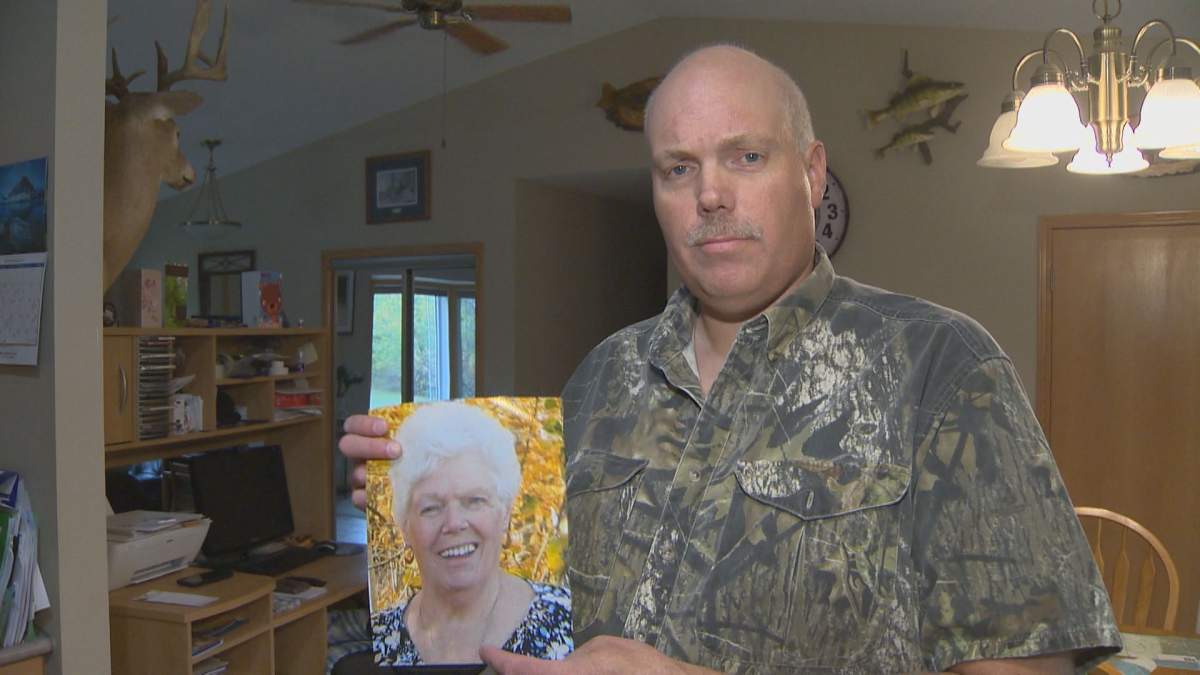Derek Kalma recalls his mother as being an outdoors enthusiast, always adventurous and active.

“My mom Rita was a homemaker, gardener, loved the outdoors. She was very active, even at 76 she was still active,” he said.
In looking back at the past year leading up to her death, Kalma said things started to change as health issues began to impact her mobility and active lifestyle.
In early June, after her third fall, Kalma said they knew there was a deeper issue. But even getting to an appointment to diagnose the issue proved to be a major hurdle for the family from Beausejour, Man.
“In the span of two weeks we had three appointments postponed,” Kalma told Global News. “And not because the MRI or CT was postponed or unavailable, it was because the transportation was not there to take her.”
Kalma said when they did finally make it to her appointment the doctors discovered that Rita has a malignant brain tumour.
“When cancer rears its ugly head, you don’t wait around,” said Kalma.
Waiting around is, unfortunately, what the family had to do again as they faced more delays in accessing transportation to get Rita from the hospital in Beausejour to the Health Sciences Centre in Winnipeg for radiation treatment. He said, again, no ambulance or stretcher service was available. His mother was forced to postpone appointments due to the lack of transportation to take her to where she needed to be.
“We waited at 7 am and we finally got the call at 3 pm that there was no transportation available to take her to HSC,” he said.
“Which at this point is extremely frustrating because (with) cancer, that puts you at the top of the list for priority so for no transportation to be available to start this process was quite frustrating. I think, all together, we lost about two weeks of treatment because of the transportation issues. I’m not faulting the system because by the time we found out what it was that was ailing her, I don’t think it would have made a difference. (But) it may have bought us more time with her here.”

Get weekly health news
Rita died two weeks ago.
Access to the town’s ER department is determined based on if and when a doctor is available. A schedule of when the department is open is available online on the Interlake-Eastern Regional Health Authority’s website.
In a statement to Global News on Sept. 25, the health authority said it continues to experience “service disruptions in emergency rooms across the region….When we are aware in advance of physician or staff shortages, we advise publicly via our website of any changes in emergency department status.”

A community effort
As a way to circumnavigate the rural closures and issues voiced by Manitobans, John MacKay — a retired paramedic — began operating a transportation service to get Manitobans to and from hospitals or clinics, to get people to things like non-emergency appointments and check-ins. MacKay, owner of Community Paramedics Service Inc. said the service was there to help those using wheelchairs to go from one community to another.
Seven vans were operated by retired and off-duty paramedics. The service, according to MacKay, was so popular that he was approached by the Interlake Eastern Regional Health Authority to set up repatriations between Selkirk and Winnipeg. In the span of a year and a half, he noted 3,500 people were provided with the services.
“We make a lot of friends, we drink a lot of coffee, and we do it much more efficiently,” said MacKay. “At least we were… until we were stopped.”
According to MacKay, he had reached out to the province for a license for his business. It was denied. He said the province had denied him on the basis that his service did not offer transportation for people in stretchers.
“I’m still a paramedic. But there’s nothing I can do about it. It does break my heart. Not because I need to work, but because of the patients, some of whom I’ve gotten to know quite dearly are not making it to these appointments,” said MacKay.
Manitoba’s Emergency Medical Response and Stretcher Transportation Act states that anyone looking to operate an emergency medical response system or stretcher transportation service must obtain a license from the province. Such services cannot be provided without the required licenses, notes the act.
In a statement on Sept. 25, Shared Health said MacKay’s business is “not licensed by Manitoba Health to provide patient transport to individuals requiring stretcher-based transportation and/or potential medical interventions by trained clinical escorts should the patient’s condition begin to deteriorate.” It further added that Shared Health has a dedicated stretcher service, launched earlier this year and that serve three communities. According to the agency, this service provides a way for patients to go to appointments or be transferred between facilities.
Kalma said that he was able to get his mother to her radiation treatment by paying out of pocket to utilize MacKay’s service. In the end, he said the delays and uncertainty meant his mother lost precious time.
— With files from Global’s Marney Blunt.









Comments